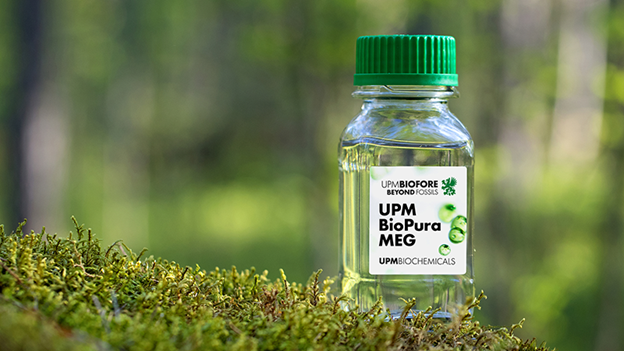
This post appears courtesy of Doris de Guzman and was originally published on the GreenChemicals Blog.
UPM Biochemicals is gearing up for its incoming wood-based glycols production in Leuna, Germany, which is expected to be operational by the end of 2023 and ramping up to its full 220 ktpa biorefinery capacity by 2024. The main products that will be produced from the biorefinery are Bio-MEG (monoethylene glycol), bio-MPG (monopropylene glycol), renewable functional fillers (RFF) derived from lignin, and industrial sugar.
UPM announced a development partnership with South Korea-based Dongsung Chemical this month using UPM’s bio-MEG BioPura™ to manufacture renewable polyurethane. The companies will target the Asian market and its vast textile and footwear indus tries. Dongsung Chemical plans to diversify its portfolio by advancing its eco-friendly product lines by integrating UPM’s bio-MEG into its production. The company intends to expand the field of application to automotive interior materials and adhesives.
tries. Dongsung Chemical plans to diversify its portfolio by advancing its eco-friendly product lines by integrating UPM’s bio-MEG into its production. The company intends to expand the field of application to automotive interior materials and adhesives.
Dongsung intends to reduce its carbon emissions by 10% by 2030. In June, the company launched a biodegradable packaging material brand called ECOVIVA®. Dongsung is planning to build pilot facilities for the development of various biodegradable products such as biodegradable functional films, adhesives and foams. I’m noticing a pattern of South Korean chemical companies getting fully involved in the biodegradable plastics space – LG Chem, CJ Cheiljedang, SK Group, GS Caltex, Lotte Chemical…
As always, Tecnon OrbiChem’s Bio-Materials report regularly covers the petro-based and bio-based glycols space. India Glycols is currently the only commercial bio-based MEG producer we know of, but several companies are expected to soon join this market.


 Doris de Guzman
Doris de Guzman



